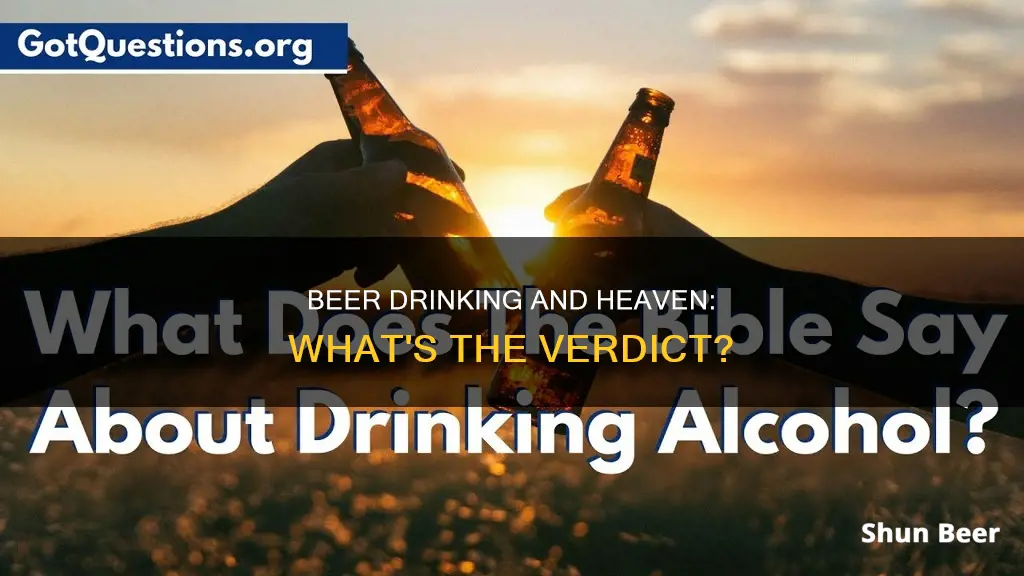
Drinking alcohol is a topic that has been widely debated in Christianity, with some arguing that it is acceptable in moderation, while others believe it is a sin that can lead to addiction and negative consequences. The Bible recognises the ability of alcohol consumption to bring joy or gladness, and even has beneficial physical effects according to 1 Timothy 5:23. However, it also warns against excessive drinking and drunkenness, which is considered a sin. While drinking beer or other alcoholic beverages may not be explicitly forbidden, Christians are advised to be mindful of their consumption and not let it become a source of addiction or a barrier between them and God. Ultimately, the decision to drink or not is a personal one, and each individual must examine their own beliefs, intentions, and the potential impact on themselves and others.
What You'll Learn

Drinking alcohol is not forbidden in Christianity
Jesus drank wine, and his first miracle was turning water into wine at a wedding after they had run out. In fact, God himself is said to like wine. However, the Bible does condemn drunkenness, which it describes as debauchery.
Some Christians choose not to drink alcohol because of the risk of addiction, and the potential for alcohol to come between them and God. However, others believe that drinking alcohol is fine, as long as it is done in moderation and does not become something that they rely on or are enslaved to.
Ultimately, the decision to drink alcohol or not is a personal one for Christians, and there is no clear consensus on the matter.
Morning Beer: Is It a Healthy Habit or Not?
You may want to see also

Drunkenness is considered a sin
The Bible recognises the ability of alcohol consumption to impart joy or gladness (Ecclesiastes 9:7; Psalm 104:15), and even some beneficial physical effects (1 Timothy 5:23). However, it also warns in multiple passages of the negative effects of excessive alcohol consumption.
The Bible also warns of allowing any influence (person or thing) to come between the individual and God to the point where the individual would be unalterably opposed to giving it up. In effect, exhibiting by action (if not words) a greater love for that influence than for God.
Jesus drank wine and even made wine for a wedding after they had run out. However, the Bible makes it clear that drunkenness is a sin.
Some Christians take a hardline zero-alcohol approach, not because the Bible forbids it, but because of the addictive nature of alcohol.
Drinking Beer on New Jersey Beaches: What's Allowed?
You may want to see also

The Bible does not forbid drinking alcohol but warns against drinking to excess
However, the Bible does caution against the negative consequences of excessive alcohol consumption. For instance, in Romans 14:21, Paul writes, "It is good not to eat meat or drink wine or do anything that causes your brother or sister to stumble." This passage highlights the importance of considering the impact of one's actions on others and avoiding behaviours that might lead others into sin.
Similarly, in Ephesians 5:18, Paul exhorts believers to "not get drunk on wine, which leads to debauchery." The Bible recognises that alcohol can bring joy and even offer physical benefits when consumed in moderation. Nevertheless, it is essential to maintain self-control and avoid becoming enslaved to alcohol or any other substance.
The key distinction, therefore, lies between enjoying a drink and indulging to the point of drunkenness or addiction. Christians are called to remain vigilant and ensure that their actions do not create a barrier between themselves and God or cause harm to themselves or others.
Wisconsin's Drinking Laws: Beer and Underage Drinking
You may want to see also

Drinking alcohol is allowed in moderation
Drinking alcohol in moderation is allowed for Christians. The Bible recognises the ability of alcohol consumption to impart joy or gladness (Ecclesiastes 9:7; Psalm 104:15), and even some beneficial physical effects (1 Timothy 5:23). However, it also warns in multiple passages of the negative effects of excessive alcohol consumption.
Jesus drank wine, and he also made wine for a wedding after they had already run out. God Himself likes wine. However, if you feel convicted, don't drink. As Christians, we must have our wits about us, so do not get intoxicated. "Be ye filled not with wine but rather the Holy Spirit."
The Bible never condemns drinking alcohol, but it does condemn getting drunk. Drunkenness is debauchery. Drinking alcohol is not forbidden in Christianity, but alcohol addiction is effectively a sin in the Bible.
Paul told Timothy to drink a little wine for his stomach's sake (1 Timothy 5:23). Jesus' talk about drinking wine in heaven is analogous to the lifeforce of God.
Beer and No-Carb Diets: What You Need to Know
You may want to see also

Drinking alcohol is not a sin, but loving alcohol and becoming a slave to it is
The Bible also warns of the dangers of drunkenness, with multiple passages condemning it as a sin. For example, in 1 Corinthians 6:9-11 and Galatians 5:19-21, drunkenness is listed as a work of the "flesh", and in 1 Corinthians 10, Paul advises that "all things are lawful" but not all things are beneficial, and that one should not seek their own good but the good of their neighbour.
The key distinction, then, is between drinking alcohol in moderation and getting drunk. Drinking alcohol in moderation can be relaxing and enjoyable, and is not inherently sinful. However, when alcohol consumption becomes excessive, it can lead to negative consequences and can become a barrier between the individual and God.
As the Bible says, "Do not be drunk with wine but be filled with the Spirit" (Ephesians 5:18). This passage highlights the importance of prioritising spiritual fulfilment over earthly pleasures. While drinking alcohol in moderation can be enjoyable, it should not become a person's primary source of joy or comfort. Instead, they should seek to be filled with the Holy Spirit and to find their fulfilment in God.
In conclusion, drinking alcohol in moderation is not a sin, but loving alcohol and becoming a slave to it is. The key is to maintain self-control and to ensure that alcohol does not become an idol or a barrier between the individual and God.
Beer and Librium: A Risky Mix?
You may want to see also
Frequently asked questions
Drinking alcohol is not a sin, but getting drunk is. The Bible recognises the ability of alcohol consumption to impart joy or gladness and even has some beneficial physical effects. However, it also warns of the negative effects of excessive drinking.
It is unlikely that alcohol will be consumed in heaven. It is believed that the joy and love experienced in heaven would preclude the need for alcohol.
The Bible does not forbid drinking alcohol. Jesus drank wine and even made wine for a wedding. However, it is important to maintain self-control and not become enslaved to alcohol or any other substance.
The only sin that can send a person to hell is unbelief in Jesus Christ as the Son of God and Saviour. While drinking alcohol is not inherently a sin, it can become one if it leads to adverse effects in a person's life or causes them to be opposed to God.
It is important to recognise and continually repent of alcohol addiction. Seeking help from support groups or professionals, such as Alcoholics Anonymous, can be beneficial in overcoming this struggle.







